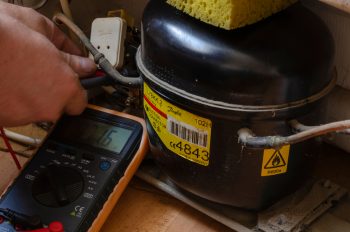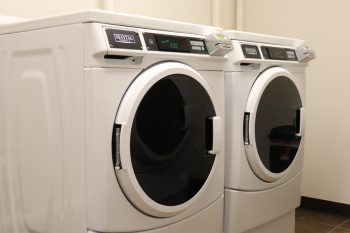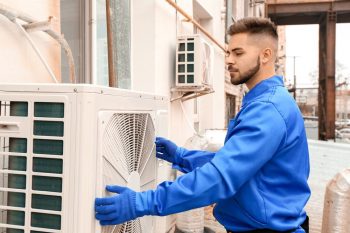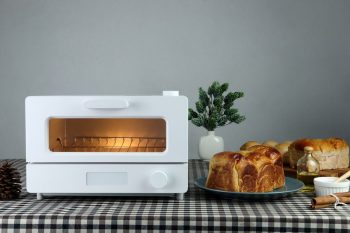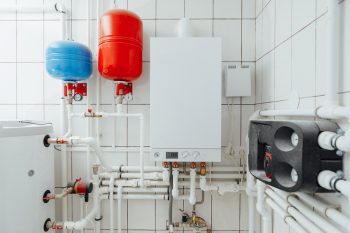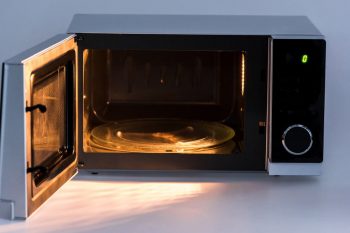
Propane refrigerators, also known as gas fridges, are unique appliances that provide cooling without the need for electricity. Instead, they utilize propane gas to facilitate absorption refrigeration, a process that’s distinct from the compression refrigeration system found in conventional electric refrigerators.
In this comprehensive guide, we’ll delve into the inner workings of a propane refrigerator, highlighting its key components, the role of propane fuel in facilitating cooling, the benefits of using a propane refrigerator over an electric one, and safety precautions to consider when using one.
A propane refrigerator works by using propane gas to heat a mixture of water and ammonia in a generator. The heat causes the ammonia to evaporate and rise into a condenser, where it cools and becomes a liquid. This liquid ammonia then goes into an evaporator where it mixes with hydrogen gas, absorbs heat from the fridge’s interior, and creates a cooling effect. This continuous cycle of evaporation, condensation, and absorption maintains the cool temperature inside the refrigerator.
The Unique Working Principle of Propane Refrigerators
The cooling process of a propane refrigerator revolves around a combination of water, ammonia, and hydrogen gas, which work together to create a cooling effect within the refrigerator. Here’s a step-by-step breakdown of the process:
- A propane flame heats a mixture of water and ammonia in the generator, causing the ammonia to evaporate and rise into the separator.
- The gaseous ammonia flows upward into the condenser, where it dissipates heat and converts back to a liquid.
- The liquid ammonia makes its way to the evaporator, where it mixes with hydrogen gas and evaporates, producing cold temperatures inside the refrigerator.
- The ammonia and hydrogen gases flow to the absorber, where the water collected in the separator mixes with the ammonia and hydrogen gases.
This cycle of evaporation, condensation, and absorption repeats continuously, creating and maintaining a cool temperature inside the refrigerator compartment.
Key Components of a Propane Refrigerator
A propane refrigerator consists of several key components that work in tandem to provide efficient cooling. These include:
- Burner Assembly: This is where the propane gas is ignited to produce a controlled flame, providing the necessary heat for the refrigeration process.
- Insulation: This minimizes heat transfer to the outside environment, ensuring optimal cooling efficiency and energy conservation.
- Refrigerator Compartment: This is where you store your food and beverages. It’s designed with shelves and compartments to organize and keep your items cool and fresh.
- Propane Supply System: This system, consisting of propane tanks, valves, and regulators, delivers the propane gas to the burner assembly, providing the fuel needed for the refrigeration process.
The Role of Propane in Cooling
The propane fuel in a propane refrigerator facilitates the absorption refrigeration process by heating a mixture of water and ammonia in the generator. The heat from the propane flame causes the ammonia to evaporate, which then rises into the condenser. Here, it cools and returns to a liquid state, before flowing into the evaporator, where it mixes with hydrogen gas. This reaction absorbs heat from inside the refrigerator, creating a cooling effect.
Benefits of Propane Refrigerators
Propane refrigerators offer several benefits over their electric counterparts:
- Off-Grid Capability: Propane refrigerators are ideal for locations without reliable access to electricity, such as cabins, RVs, and remote homes.
- Energy Efficiency: Propane refrigerators are highly energy-efficient, offering substantial energy savings over time.
- Consistent Cooling: They provide steady, reliable cooling without fluctuations, keeping your food and beverages at optimal temperatures.
- No Moving Parts: With no moving parts, propane refrigerators have fewer components that can fail, leading to less frequent repairs and longer appliance lifespan.
Safety Precautions for Propane Refrigerators
While propane refrigerators are generally safe, it’s important to follow certain precautions:
- Ensure proper ventilation to prevent propane gas build-up.
- Regularly check for any propane leaks.
- Keep the refrigerator level to prevent damage to the coils.
- Install carbon monoxide detectors near the refrigerator, as propane combustion can emit this hazardous gas.
- Regularly maintain your propane refrigerator to ensure safe and reliable operation.
In conclusion, propane refrigerators are a reliable and energy-efficient cooling solution, especially in off-grid and remote locations. By understanding how they work, you can make the most of these unique appliances and enjoy their many benefits.
Frequently Asked Questions
How long does a propane tank typically last for a propane refrigerator?
The longevity of a propane tank depends on the size of the tank and the refrigerator’s usage. On average, a 20-pound propane tank can last for about 3-4 weeks with continuous use.
Can a propane refrigerator be used indoors?
Yes, propane refrigerators can be used indoors. However, proper ventilation is crucial to prevent propane gas build-up, and it’s recommended to install carbon monoxide detectors near the refrigerator.
How cold can a propane refrigerator get?
Most propane refrigerators can easily maintain temperatures between 32°F (0°C) and 40°F (4°C), which is the ideal range for food preservation.
Is it safe to leave a propane refrigerator running when not at home?
Yes, it is safe to leave a propane refrigerator running when you’re not at home. These appliances are designed for continuous operation. However, routine maintenance checks and following safety precautions are essential.
How often should a propane refrigerator be serviced?
It’s recommended to service your propane refrigerator once a year. Regular maintenance helps ensure safe and efficient operation and extends the lifespan of the appliance.

